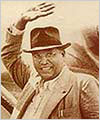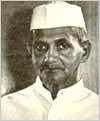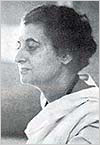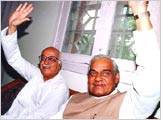The well-known historian on ten events that changed the face of Independent India:
 1. Mahatma Gandhi's assassination in 1948: He was the greatest individual of the twentieth
century who impressed not only India but also the entire world. He brought a new technique in the revolutionary
process -- the idea of using non-violence. He was murdered by a Hindu fanatic which brought a big change in India,
especially after Partition in the previous year.
1. Mahatma Gandhi's assassination in 1948: He was the greatest individual of the twentieth
century who impressed not only India but also the entire world. He brought a new technique in the revolutionary
process -- the idea of using non-violence. He was murdered by a Hindu fanatic which brought a big change in India,
especially after Partition in the previous year.
 2. Framing of the Constitution: India was determined to be a democratic, secular republic. Democracy was born because of the British connection and due to India's leaders like Nehru. Secularism was the result of Gandhi's death, as leaders wanted to establish all religions as equal. Nehru was of course committed to India becoming a republic. He wanted to stay in the Commonwealth but India had to be a republic. So, he changed the whole concept of the Commonwealth. From an English-dominated multicultural, multinational group, he made it into an Asian-dominated one. After India became a republic, Pakistan, Sri Lanka and now Malaysia became republics. The Commonwealth is a great international force in the world, especially during the years of the Cold War between the Soviet Union and the United States.
2. Framing of the Constitution: India was determined to be a democratic, secular republic. Democracy was born because of the British connection and due to India's leaders like Nehru. Secularism was the result of Gandhi's death, as leaders wanted to establish all religions as equal. Nehru was of course committed to India becoming a republic. He wanted to stay in the Commonwealth but India had to be a republic. So, he changed the whole concept of the Commonwealth. From an English-dominated multicultural, multinational group, he made it into an Asian-dominated one. After India became a republic, Pakistan, Sri Lanka and now Malaysia became republics. The Commonwealth is a great international force in the world, especially during the years of the Cold War between the Soviet Union and the United States.
3. Suez in 1956: Nehru stood out for the Asian community opposing aggression by Britain and got the support of the United States and the Soviet Union in standing up for India and the other Asian countries. That was a great achievement. The other was non-alignment. India was not a part of either Soviet Union or the United States but
was a third force as established by the Suez. Nehru was the saviour of the Commonwealth and he kept India as a
non-aligned mediatory state.
 4. Chinese Aggression: Next major change happened in 1962 when the Chinese betrayed us and went to war on the border dispute. Nehru's policy had been to work with China but the Chinese are a real politicks. They were not bothered, especially Mao Zedong. I think Zhou-en-Lai was prepared to reach a compromise with India but
Mao was very tough. He disliked India's connections with the Soviet Union and therefore decided to
break India. He knew India was not a military power and was not prepared for a war. But he pushed the army
across the borders and humiliated India.
4. Chinese Aggression: Next major change happened in 1962 when the Chinese betrayed us and went to war on the border dispute. Nehru's policy had been to work with China but the Chinese are a real politicks. They were not bothered, especially Mao Zedong. I think Zhou-en-Lai was prepared to reach a compromise with India but
Mao was very tough. He disliked India's connections with the Soviet Union and therefore decided to
break India. He knew India was not a military power and was not prepared for a war. But he pushed the army
across the borders and humiliated India.
5. Death of Jawaharlal Nehru in 1964: He was a great visionary who has set India on the road to democracy, non-alignment, secularism, economic planning, etc. His death was a big shock to India and a big blow to the
world of peace and harmony.
 6. Lal Bahadur Shastri: He was the next prime minister but didn't last long because of his heart ailment. He was at the helm when we fought the Pakistanis in 1965 and clearly restored India's prestige in the world. After the Chinese debacle of 1962, Shastri brought India into some form of standing up for herself.
6. Lal Bahadur Shastri: He was the next prime minister but didn't last long because of his heart ailment. He was at the helm when we fought the Pakistanis in 1965 and clearly restored India's prestige in the world. After the Chinese debacle of 1962, Shastri brought India into some form of standing up for herself.
 7. Indira as prime minister: 16 months after Nehru's death Indira Gandhi became the prime minister. She was the PM of black and white. She has good things in her favour and bad things against her. Her good point came in 1971 when she split Pakistan and helped create the sovereign state of Bangladesh. The bad thing was: she was too
influenced by her son, Sanjay Gandhi. She declared the Emergency in 1975 and imprisoned all the
leading Opposition leaders. The Indian people gave her a fitting reply by throwing her out of power in 1977 when she dared to have the General Election. She did not win a single seat in Uttar Pradesh then. But when she came back to office she was not the same Indira Gandhi who was in her bloom in the 60s and 70s. She lacked the drive and the impulse especially after Sanjay Gandhi's death -- whom she intended to be her successor. She stumbled along as the PM and there was no great achievement to her credit in her second term till she was assassinated in 1984. That was the end of the Nehru-Gandhi period.
7. Indira as prime minister: 16 months after Nehru's death Indira Gandhi became the prime minister. She was the PM of black and white. She has good things in her favour and bad things against her. Her good point came in 1971 when she split Pakistan and helped create the sovereign state of Bangladesh. The bad thing was: she was too
influenced by her son, Sanjay Gandhi. She declared the Emergency in 1975 and imprisoned all the
leading Opposition leaders. The Indian people gave her a fitting reply by throwing her out of power in 1977 when she dared to have the General Election. She did not win a single seat in Uttar Pradesh then. But when she came back to office she was not the same Indira Gandhi who was in her bloom in the 60s and 70s. She lacked the drive and the impulse especially after Sanjay Gandhi's death -- whom she intended to be her successor. She stumbled along as the PM and there was no great achievement to her credit in her second term till she was assassinated in 1984. That was the end of the Nehru-Gandhi period.
 8. Rajiv takes on after Indira: Rajiv Gandhi became the prime minister after her death. That was a bit of a gimmick. President Zail Singh suddenly made him the PM. He was elected later with a huge majority but he carried on as a second rate leader with a huge majority. He enjoyed himself thoroughly, holidaying in Lakshadweep, this place, that place... enjoying himself. He also got involved with the Bofors scandal and was finally eliminated. His death brought a decline in the Congress party. Though Narasimha Rao was the PM for five years, he did very little for the party. His own name was engulfed in corruption, which led to the rise of Sonia Gandhi. She too has not been able to stop the decline in the party.
8. Rajiv takes on after Indira: Rajiv Gandhi became the prime minister after her death. That was a bit of a gimmick. President Zail Singh suddenly made him the PM. He was elected later with a huge majority but he carried on as a second rate leader with a huge majority. He enjoyed himself thoroughly, holidaying in Lakshadweep, this place, that place... enjoying himself. He also got involved with the Bofors scandal and was finally eliminated. His death brought a decline in the Congress party. Though Narasimha Rao was the PM for five years, he did very little for the party. His own name was engulfed in corruption, which led to the rise of Sonia Gandhi. She too has not been able to stop the decline in the party.
 9. Defeat of Dr Manmohan Singh: The great tragedy of the last election was the defeat of Dr Manmohan Singh. He was an outstanding finance minister who did a lot for the country from 1991-95. He reversed the whole policy of socialism, planning etc of the Nehru period. What he started was to improve the economic conditions -- but the poor man has been defeated. That is a big loss.
9. Defeat of Dr Manmohan Singh: The great tragedy of the last election was the defeat of Dr Manmohan Singh. He was an outstanding finance minister who did a lot for the country from 1991-95. He reversed the whole policy of socialism, planning etc of the Nehru period. What he started was to improve the economic conditions -- but the poor man has been defeated. That is a big loss.
 10. The Bharatiya Janata Party: We now have a BJP government in office. The BJP was in a bad shape when Indira Gandhi died. Now they are comfortably settled in Parliament. The loss of the Congress party also meant the strengthening of Hindu chauvinism. The country has been swinging to the right but whether it is bad or good is for anyone to say. But I am actually not comfortable with the rise of the BJP. The party will now be in office for five years. Many intellectuals of outstanding ability have openly joined the BJP. They include army officers, Generals etc. I have a feeling that earlier when Krishan Menon was the defence minister, there was a hostility to Pakistan and a
desire to be friendly with China. Now, the anti-Pak feeling is growing in India and I do not know what will happen. Both India and Pakistan are nuclear powers, so, the danger is more now, especially on the issue of Kashmir.
10. The Bharatiya Janata Party: We now have a BJP government in office. The BJP was in a bad shape when Indira Gandhi died. Now they are comfortably settled in Parliament. The loss of the Congress party also meant the strengthening of Hindu chauvinism. The country has been swinging to the right but whether it is bad or good is for anyone to say. But I am actually not comfortable with the rise of the BJP. The party will now be in office for five years. Many intellectuals of outstanding ability have openly joined the BJP. They include army officers, Generals etc. I have a feeling that earlier when Krishan Menon was the defence minister, there was a hostility to Pakistan and a
desire to be friendly with China. Now, the anti-Pak feeling is growing in India and I do not know what will happen. Both India and Pakistan are nuclear powers, so, the danger is more now, especially on the issue of Kashmir.
As told to Shobha Warrier
Tell us what do you think of this list?
